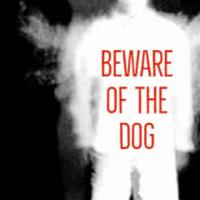Beware of the Dog (2)
'You're looking fine this evening,' she said. 'They operated on you as soon as you came in. They did a marvelous job. You'll be all right. I've got a brother in the RAF,' she added. 'Flying bombers.'
He said, 'I went to school in Brighton.'
She looked up quickly. 'Well, that's fine,' she said. 'I expect you'll know some people in the town.'
'Yes,' he said, 'I know quite a few.'
She had finished washing his chest and arms. Now she turned back the bedclothes so that his left leg was uncovered. She did it in such a way that the rest of his injured leg remained under the sheets. She took his pyjama trousers off and now began to wash his left leg and the rest of his body. This was the first time that he had had a bed-bath and he was embarrassed. She laid a towel under his leg and began washing his foot. She said, 'This soap is awful to use. It's the water. It's so hard.'
He said, 'None of the soap is very good now and, of course, with hard water it's hopeless.' As he said it he remembered something. He remembered the baths which he used to take at school in Brighton. He remembered how the water was so soft that you had to take a shower afterwards to get all the soap off your body. He remembered that sometimes the school doctor used to say that soft water was bad for your teeth.
'In Brighton,' he said, 'the water isn't...'
He did not finish the sentence. He had thought of something; something so unbelievable that for a moment he felt like telling the nurse about it and having a good laugh.
She looked up. 'The water isn't what?' she said.
'Nothing,' he answered. 'I was dreaming.'
She wiped the soap off his leg and dried him with a towel.
'It's nice to be washed,' he said. 'I feel better.'
That night he could not sleep. He lay awake thinking of the German aircraft and of the hardness of the water. He could think of nothing else. They were German, he said to himself. I know they were. But it is not possible, because they would not be flying around so low over here in daylight. I know that it is true, and at the same time I know that it is impossible. Perhaps I am ill.
Perhaps I am imagining all this. For a long time he lay awake thinking these things, and once he sat up in bed and said aloud, 'I will prove that I am not crazy,' but before he had time to think any more, he was asleep.
He woke just as the first light of day was showing through the gap in the curtains at the window. He remembered the Junkers 88 and the hardness of the water; he remembered the large pleasant nurse and the kind doctor, and now the doubt in his mind began to grow.
He looked around the room. The nurse had taken the roses out the night before. There was nothing except the table with a packet of cigarettes and a box of matches. The room was bare. It was no longer warm or friendly. It was not even comfortable. It was cold and empty and very quiet.
His doubt and fear grew so that he became restless and angry. It was the kind of fear one gets not because one is afraid but because one feels that there is something wrong. He knew that he must do something; that he must find some way of proving to himself that he was either right or wrong, and he looked up and saw again the window and the green curtains. From where he lay, that window was right in front of him, but it was ten meters away. Somehow he must reach it and look out. The idea took hold of him and soon he could think of nothing except the window. But what about his leg? He put his hand underneath the bedclothes and felt the bandages around what remained of his right leg. It seemed all right. It didn't hurt. But it would not be easy.
He sat up. Then he pushed the bedclothes away and put his left leg on the floor. Slowly, carefully, he swung his body over until he had both hands on the floor as well; then he was out of bed, kneeling on the carpet. He looked at what remained of his right leg, wrapped in bandages. It was beginning to hurt. He wanted to lie down on the carpet and do nothing, but he knew that he must go on.
With two arms and one leg, he crawled over towards the window. He would reach forward as far as he could with his arms, then he would jump and slide his left leg along after them. It was painful but he continued to crawl across the floor on two hands and one knee. When he got to the window he reached up, and one at a time he placed both hands on the sill. Slowly he raised himself up until he was standing on his left leg. Then quickly he opened the curtains and looked out.
He saw a small house standing alone beside a narrow lane, and behind it there was a field. In front of the house there was an untidy garden, and there was a green hedge separating the garden from the lane. He was looking at the hedge when he saw the sign. It was just a piece of board nailed to the top of a short pole, and because the hedge had not been cut for a long time the branches had grown out around the sign so that it seemed almost as if it had been placed in the middle of the hedge. There was something written on the board with white paint. He pressed his head against the glass of the window, trying to read what it said. The first letter was a G, he could see that. The second was an A, and the third was an R. One after another he managed to see what the letters were. There were three words, and slowly he spelled the letters out aloud to himself as he managed to read them. G-A-R-D-E A-U C-H-I-E-N, Garde au chien. That is what it said.
He stood there balancing on one leg and holding tightly to the edges of the window sill with his hands, staring at the sign and the letters of the words. For a moment he could think of nothing at all. He stood there looking at the sign, repeating the words to himself. Slowly he began to realize the full meaning of the thing. He looked at the cottage and the field and he looked at the green countryside beyond. 'So this is France,' he said. 'I am in France.'
Now the pain in his right side was very great. It felt as if someone was hitting the end of his missing leg with a hammer and suddenly the pain became so bad that it affected his head. For a moment he thought he was going to fall. Quickly he knelt down again, crawled back to the bed and got in. He pulled the bedclothes over himself and lay back on the pillow, exhausted. He could not forget the words on the sign.
It was some time before the nurse came in, with a basin of hot water. She said, 'Good morning, how are you today?'
He said, 'Good morning, nurse.'
The pain was still great under the bandages, but he did not wish to tell this woman anything. He looked at her more carefully now. Her hair was very fair. She was tall and big-boned and her face seemed pleasant. But there was something a little nervous about her eyes. They were never still. There was something about her movements also. They were too sharp to go well with the relaxed manner in which she spoke.
She put down the basin, took off his pyjama top and began to wash him.
'Did you sleep well?'
'Yes.'
'Good,' she said. She was washing his chest. 'Someone's coming to see you from the Air Ministry after breakfast,' she went on. 'They want a report. How you got shot down and all that. I won't let him stay long, so don't worry.'
Later she brought him his breakfast but he did not want to eat. He was still feeling weak and sick and he wished only to lie still and think about what had happened. And there was a sentence running through his head. It was a sentence which Johnny, his commanding officer, always repeated to the pilots every day before they went out. He could see Johnny now saying, 'And if they get you, don't forget, only give your name and number. Nothing else. For God's sake, say nothing else.'
'There you are,' she said. 'I've got you an egg. Can you manage all right?'
'Yes.'
'Good. If you want another egg, I might be able to get you one.'
'This is all right.'
'Well, just ring the bell if you want any more.' And she went out.
He had just finished eating when the nurse came in again.
She said, 'Wing Commander Roberts is here. I've told him that he can only stay for a few minutes.' She signaled with her hand and the Wing Commander came in.
'Sorry to bother you like this,' he said.
He was an ordinary RAF officer, dressed in a rather badly fitting uniform. As he spoke he took a printed form and a pencil from his pocket and he pulled up a chair and sat down.
'How are you feeling?'
There was no answer.
'Pity about your leg. I know how you feel. I hear you fought well before they got you.'
The man in the bed was lying quite still, watching the man in the chair.
The man in the chair said, 'Well, let's finish this quickly. I'm afraid you'll have to answer a few questions so that I can fill in my report. Let me see now, first of all, where had you flown from?'
The man in the bed did not move. He looked straight at the Wing Commander and he said, 'My name is Peter Williamson and my number is nine seven two four five seven.'
- THE END -

